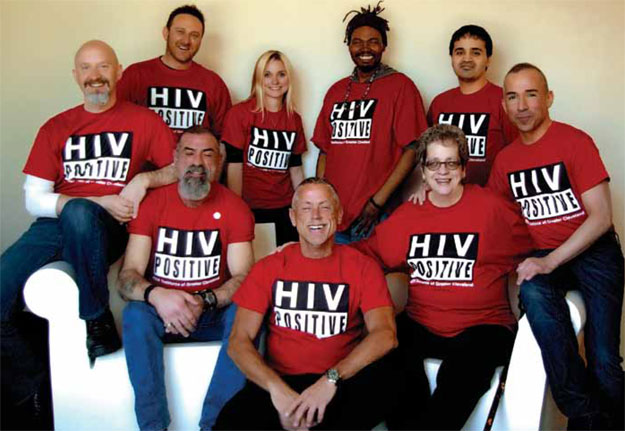Lesson 6: Groups and Organizations
Attention

These individuals have decided to wear a symbol to declare a very challenging status...being HIV Positive!
Wearing the same shirt provides a sense of connection and defines this set of people as a group!
Learning Outcomes
Upon completion of this lesson's material, students will be able to:
- Apply the concept of McDonaldization to an analysis of modern social structures.
- Identify personal group culture.
Teaching
Social Groups
A social group is a collection of two or more people who interact frequently with one another, share a sense of belonging, and have a feeling of interdependence.
From a psychological point of view, we develop a great part of our identity from the social groups that we belong to. These are not to be mixed up with groups that we socialize with (although we socialize with "social groups" as well). Social groups from the Sociological point of view are simply the diversity of groups that we interact with.
As you can tall, there are many different groups that we may belong to.
I will give you a short list of the different social groups I belong to:
- My family
- The other professors that work at KVTC
- The members of my band
- The members of this class
Social groups are distinct from aggregates (gatherings of people like at a concert) and categories (such as those "groups" that can be labeled, such as "men", "women", "African Americans", "people who play bass guitar")
These groups form a very significant part of the social structure (as we discussed in the last chapter) and often play a role in socializing us. We learn from these groups what it takes to survive in our society. In fact, we may select particular groups to belong to so that we may come to understand how they survive in our society. (Hang around with Millionaires and you will find out how to be one right?)
There are different kinds of groups as well…
Primary groups are groups with which we engage in face to face, emotion based interactions with over an extended period of time
Secondary groups this is a larger more specialized group which is more goal oriented.
At any given point there are groups to which we belong and gain a sense of identity from (In groups) and those we don't belong to (out groups)
However, there are also reference groups to which we look for guidance and influence on behavior and social attitudes. We need not be a member of the "reference group" for it to be an influence.
We see the importance of reference groups in our society as we have concern for famous individuals (role models) like athletes and movie stars and their public behavior. We are concerned about their public behavior because many individuals look to them as reference groups.
Consider that we belong to many groups at any given time. Make a list of all the groups that you relate to, either as a member or as a reference.
Group Characteristics and Dynamics
Sociologists don't only sit around and define different kinds of groups. The meat of the study of groups is to look at how they are comprised, roles within the group, norms of behavior which define the group and their inner workings.
One of the most important characteristics of a group is it's size. Small groups operate in a very different manner than larger groups.
A group can officially be designated as two or more individuals so a group can be only two people, such as a couple in a relationship or two friends.
The patterns of communication that can occur between two people can be analyzed as occurring between just the two individuals. Consider a large organization with many members and number of different interactions that can happen there.
McDonaldiaztion of Society
This is a curious observation of our society. It discusses the increased application of the "fast food" industry standards (culture) into other aspects of social interaction.
- Efficiency
- Predictability
- Calculability
- Control
In my opinion, public education is one area that has been greatly impacted by this process. Consider how policy shapes education (even at the micro level in a single institutions such as KVCC).
Assessment

Lesson 6 Discussion
Consider the following concepts of McDonaldization
- Efficiency
- Predictability
- Calculability
- Control
Lesson 6 Quiz
Identify one group that you belong to (primary or secondary groups) and one that you aspire to belong to (reference groups). For each, describe examples of the group "culture" (norms values and expectations).
- Primary or Secondary Group Culture
- Reference Group Culture